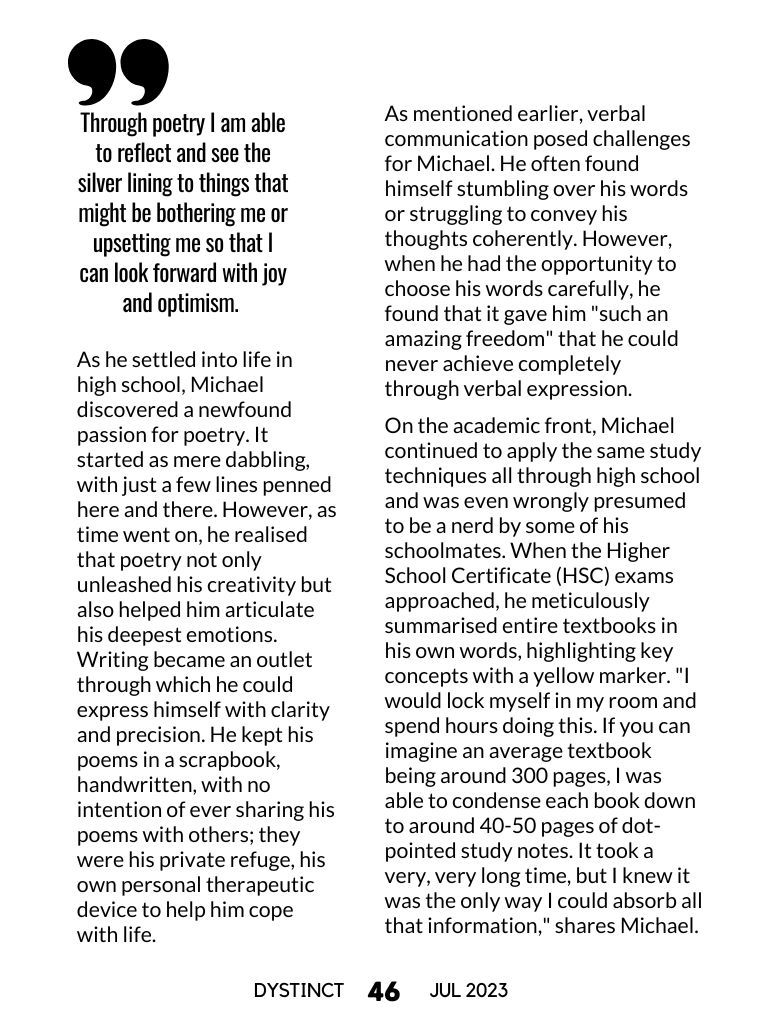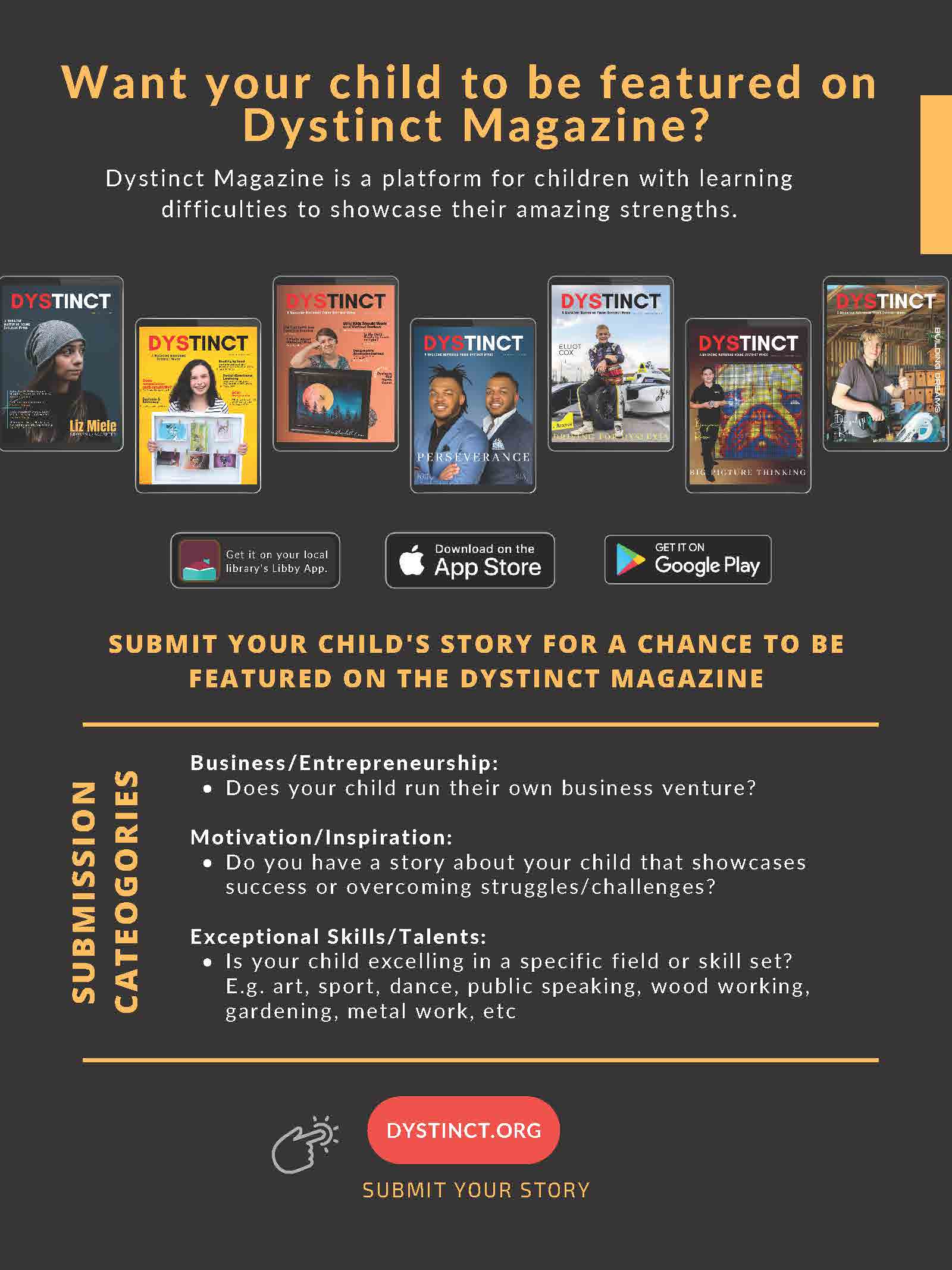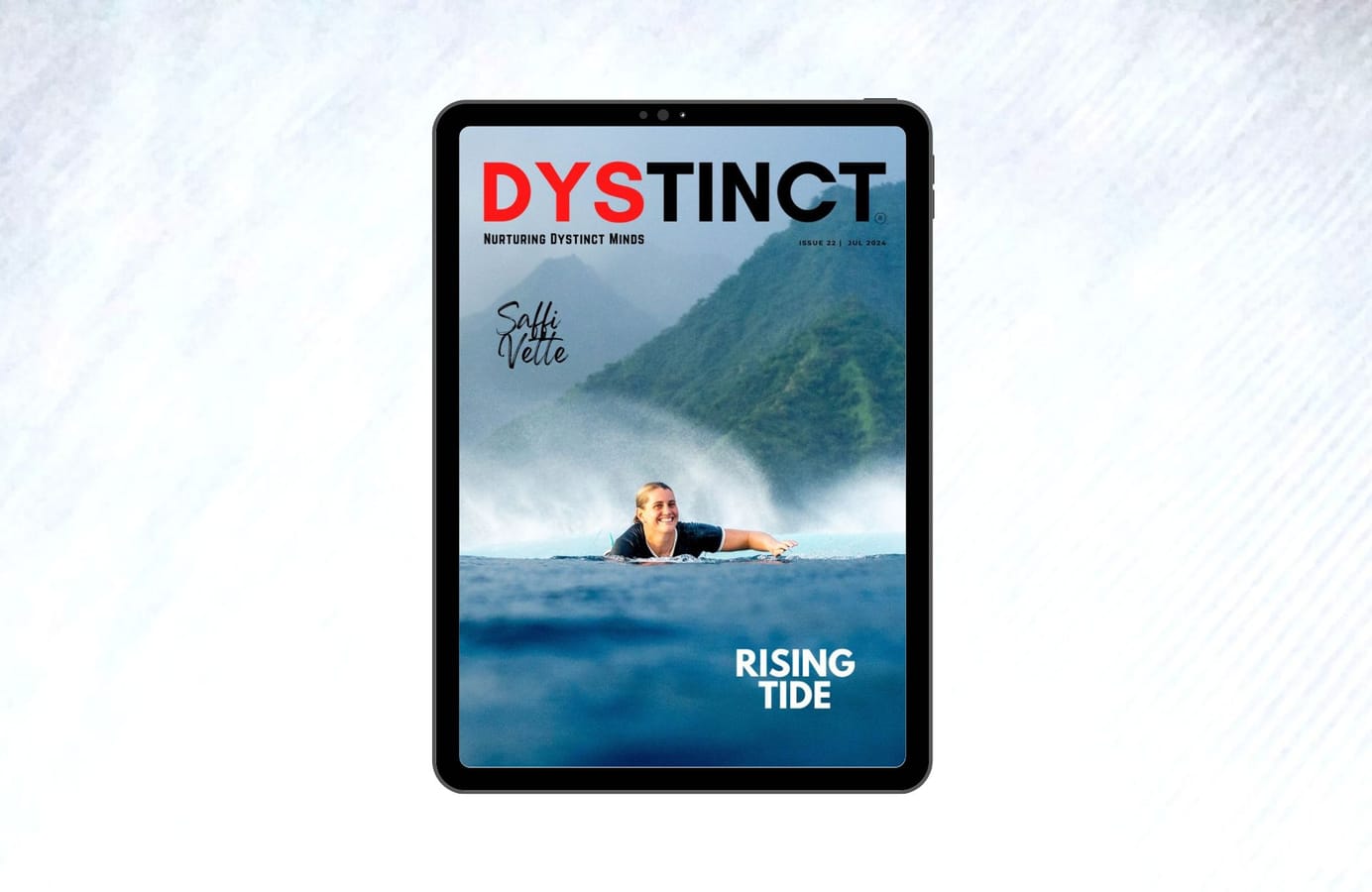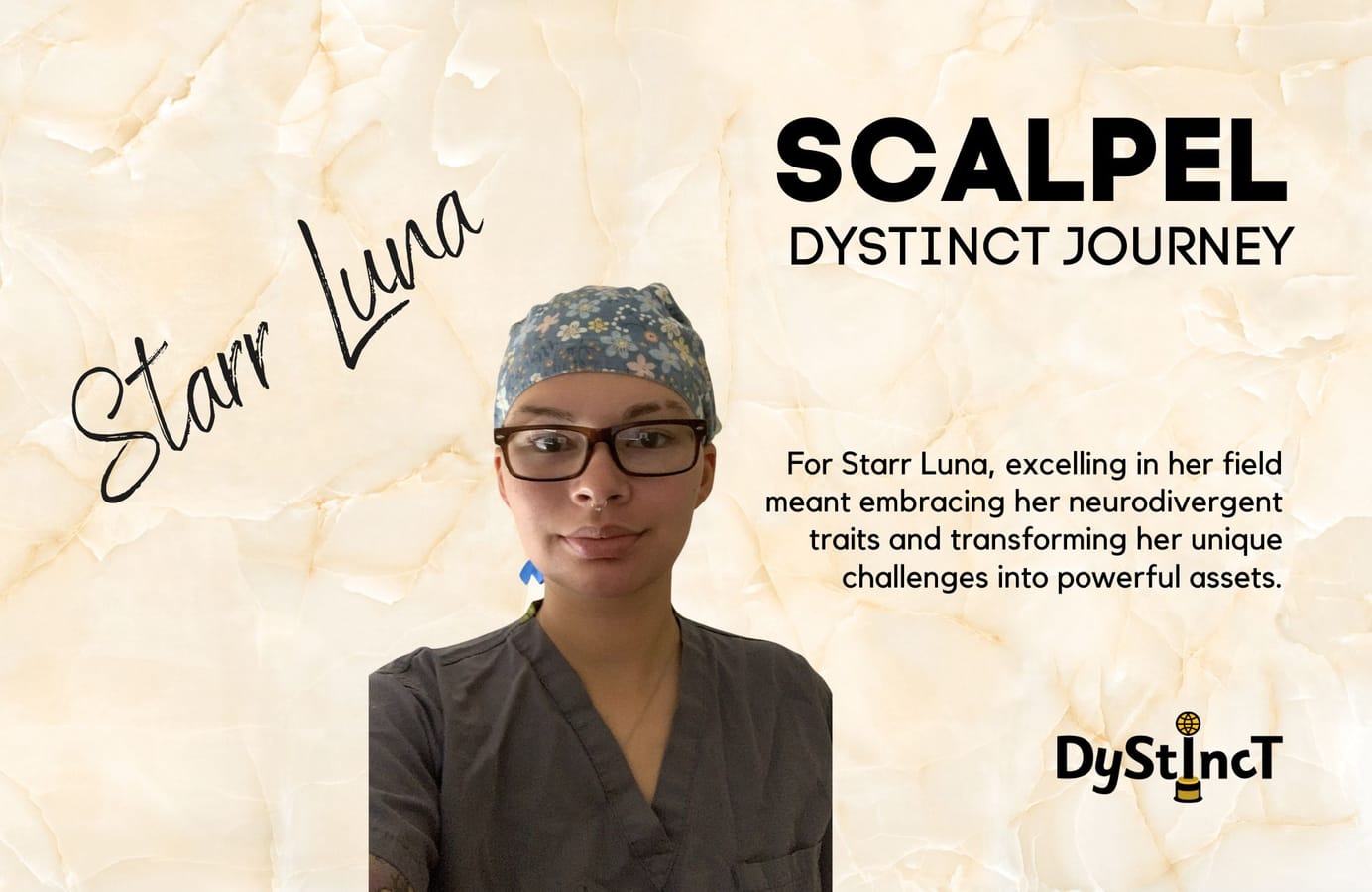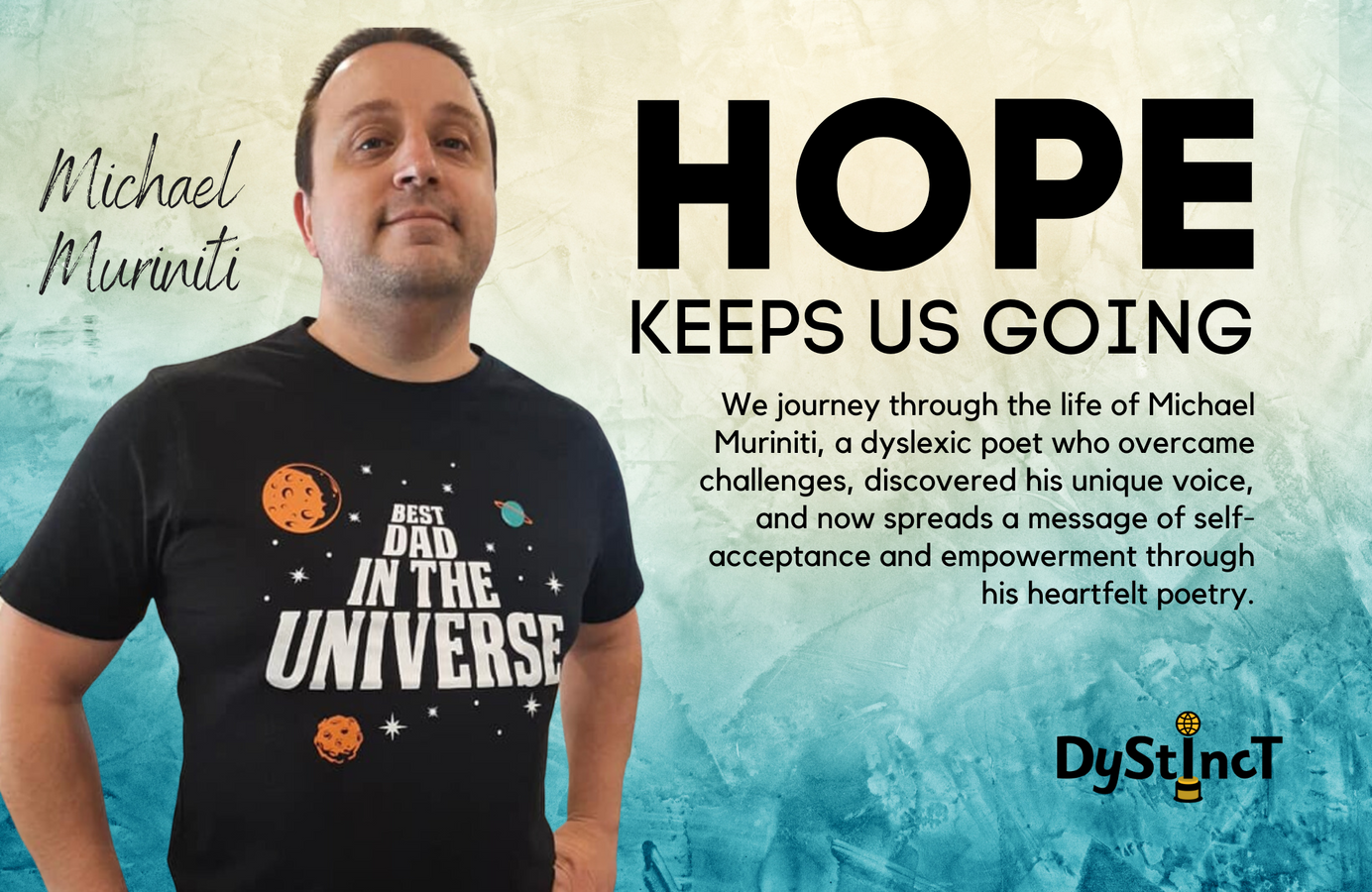
Issue 16: The Dystinct Journey of Michael Muriniti
We journey through the life of Michael Muriniti, a dyslexic poet who overcame challenges, discovered his unique voice, and now spreads a message of self-acceptance and empowerment through his heartfelt poetry.
Table of Contents
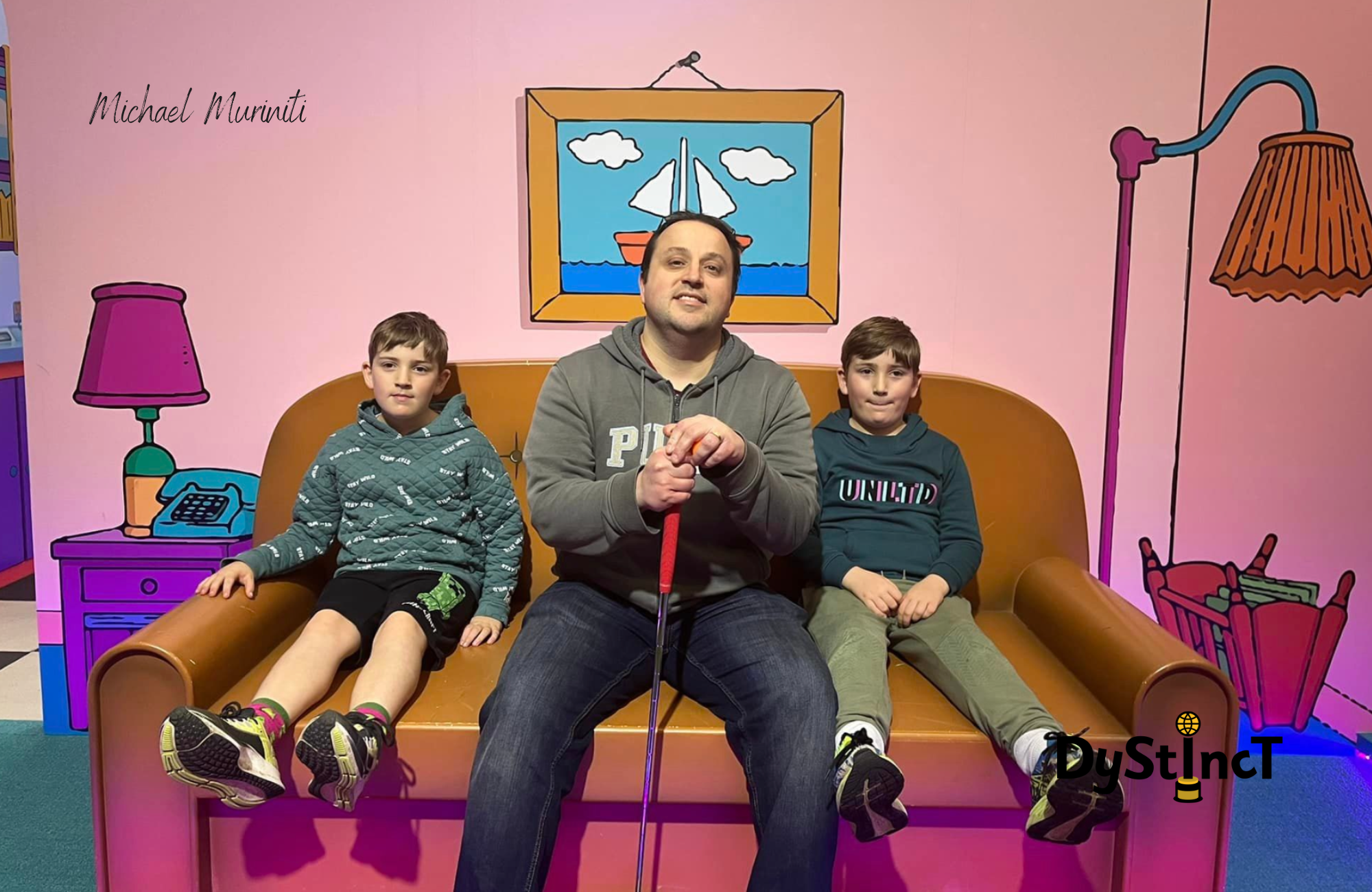
In the realm of overcoming adversity, some individuals rise above challenges and find their unique voices. One such individual is Michael Muriniti, a 39-year-old Australian poet who captivates readers from all walks of life with his remarkable verses that strike a chord deep within the soul.
Despite enduring the hardships of unsupportive teachers and battling self-esteem issues, Michael's unwavering determination and love for language have propelled him on a remarkable journey. Through his heartfelt poetry, he effortlessly captures the essence of daily struggles, offering solace, hope, and a fresh perspective to those who encounter his work.
Michael's early schooling experiences were nothing short of horrific. In Kindergarten, he was labelled as "stupid" by his teacher and was unjustly accused of not trying hard enough. As he progressed through school, he continued to experience significant challenges in reading, writing, comprehension, and coordination. "I had a horrible time self-esteem-wise as I was often called names like 'stupid', 'lazy' and 'slow'. I don't think a single solid attempt was made to make me try and understand or tackle things from a different angle. You either understood or you didn't, and if you didn't, apparently that was my fault," shares Michael.
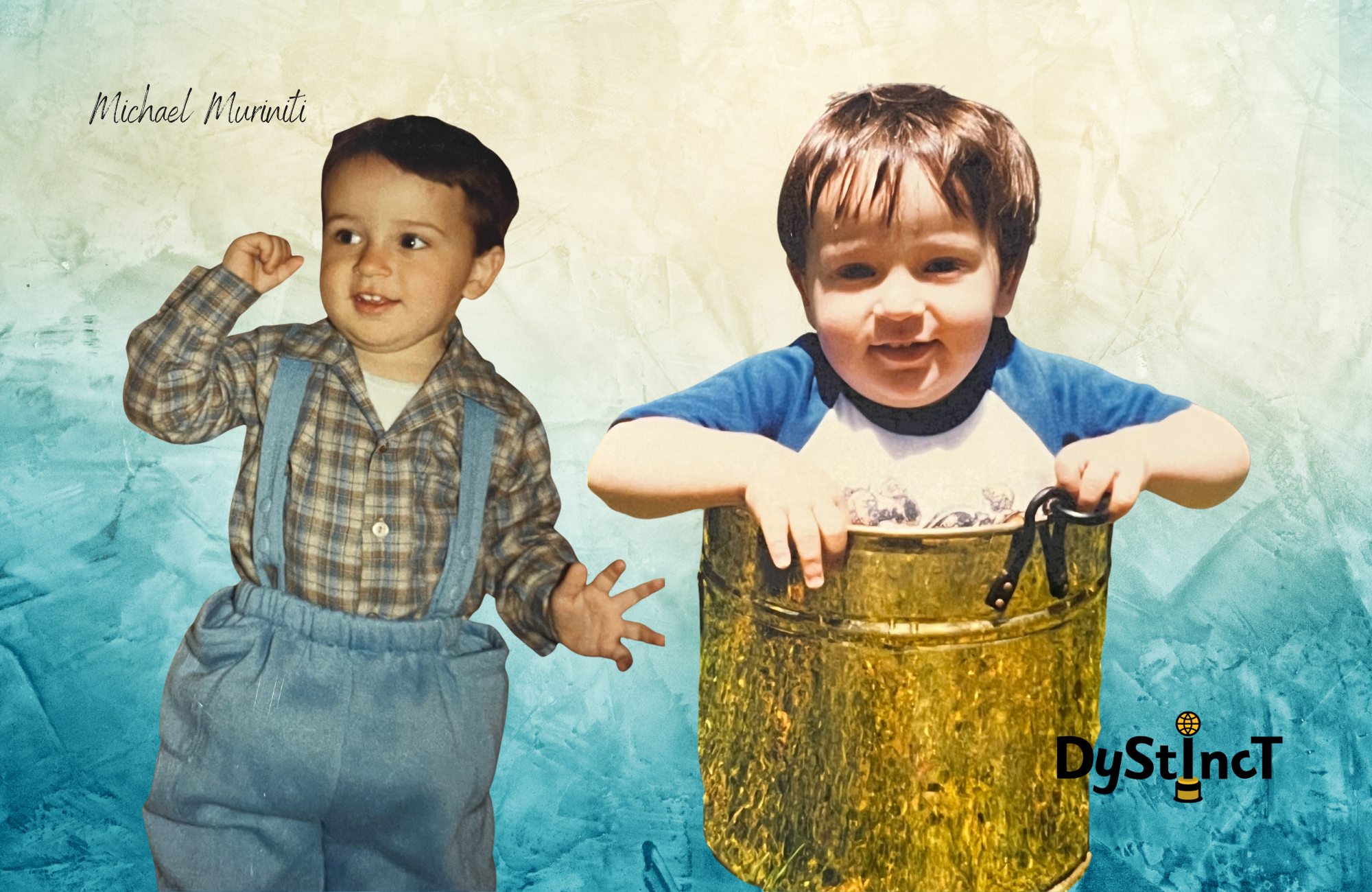
One vivid memory from Michael's childhood stands out, involving a teacher when he was 10 years old. This particular teacher would often keep him inside during lunchtime to work on his times tables. While his classmates enjoyed their free time and played outside, Michael would find himself sitting on a bench, miserably working through extra classwork. On one such occasion, his younger brother, then only 5 or 6 years old, caught Michael sitting on the bench and curiously questioned why Michael wasn't out there playing with the others. At that moment, a wave of shame washed over him as he felt the weight of setting a good example for his younger sibling.
Michael's imagination became his sanctuary during the difficult days. He would often fantasise about flying, closing his eyes, and letting the wind brush against his back on windy days, imagining that he could lift off into the air. This imaginative escape offered him a temporary respite from the challenges he was facing at school. In addition, spending time with his younger brother, sharing silly jokes and playing video games together provided moments of joy and a way to blow off steam. These simple pleasures became invaluable sources of comfort and support during hard times.
Michael shares that throughout his school years, he found it challenging to communicate with others, which resulted in him having only a few friends. "Because my brain is constantly trying to process what the other person has said, by the time I open my mouth, the conversation has moved on to another topic. So I either stay quiet or blurt something loudly over the top of someone in an attempt to get my point across before they change the topic." This communication difficulty led him to become a quiet observer, allowing him to develop a keen sense of empathy and insight into the emotions of his friends. He slowly became adept at offering comfort and support before they even expressed their feelings.
Michael recalls his mother taking him to an occupational therapist when he was approximately 9 or 10 years old. In those therapy sessions, he engaged in various activities such as knitting, puzzles, and balancing games, all of which seemed unrelated to his struggles at the time. He was even assigned homework that his mother would help him practice at home.
Around the same time, significant changes occurred within Michael's family dynamics when his father gained custody of him due to his mother's severe depression. He moved in with his father and stepmother, leading to a disruption in communication regarding his difficulties at school and the supportive therapy that he was already receiving. "I don't think I was told directly that I had dyslexia when I was younger. I remember the first time I heard it was from my father when I was around 12 years old. I think because of all the family changes, the whole communication in regard to where I was up to with my dyslexia journey got lost in translation. I don't think Dad knew enough about it and thought it had more to do with the coordination side of things, so there wasn't too much to be concerned about. I definitely don't blame him, as a lot was going on at the time. Unfortunately, it just left me more confused as to why I thought differently than everyone else. I knew I was dyslexic, but I didn't really know what that meant for me," shares Michael.
It was the first time I felt valued and special by a teacher and I still carry that memory to this day.
During this challenging time in his young life, Michael discovered a glimmer of hope and validation in the form of a remarkable teacher in grade 4. Michael recalls, "I don't know why, but I felt compelled to write her a story in my spare time. From my recollection, it was just a little story about an alien and his adventures. She actually went out of her way to put it in the school newsletter/bulletin, and it was the first time I felt valued and special by a teacher and I still carry that memory to this day. But my self-esteem was so low back then that I wasn't able to translate that into thinking I had a knack for words." This small act of encouragement left an indelible mark on Michael's memory, providing him with a newfound sense of worth and appreciation from a teacher for the first time.
Unfortunately, Michael's streak of good fortune came to an end as a new school year commenced in grade 5, bringing with it a new class teacher who perpetuated the cycle of punishment and shame solely because he struggled to grasp the concepts being taught. The tipping point came when the practice of holding him back during lunchtime was enforced again. Michael came to the realisation that he needed to discover a learning approach that suited him best, as the methods that were being used at school were of no help to him. "I think it was this time I truly got fed up. I came up with a strategy on my own to get through the work. What I came to realise was that I could not cope with information-dense work. My brain would freeze, I could not absorb the information, and I just simply could not memorise a thing. So, if I got a sheet of instructions, I would dot-point it into smaller chunks. The information would be condensed into my own words, and I would then use a highlighter in each dot point to highlight all the keywords. I realised that my brain was skimming the information by default. I have come to realise now that it does this to conserve energy with the amount of energy and effort it takes to read a lot of text. So, by putting it into dot points, using my own words and highlighting key information, it created a sort of dot-to-dot connection."
Michael discovered that his unique strategies and approach to learning also seemed beneficial in other areas of his education. In high school, he excelled in essay writing, demonstrating his ability to present well-supported arguments and stay focused without deviating. This aptitude for English led him to be placed in advanced English classes, where he relished the freedom to express his opinions without the fear of being wrong.
I overcame challenges by believing I could find a solution for myself, as it just wasn’t coming from them.
However, mathematics presented a different challenge for Michael. Its rigid structure, unlike English with its "right or wrong or black or white areas," did not align with his thinking style, which naturally sought out nuances and shades of grey. Despite his father's efforts to secure a tutor, Michael's math marks continued to disappoint. On the other hand, Ancient History captured Michael's passion. He delighted in immersing himself in the stories and connecting emotionally with the subject matter. This emotional connection enhanced his memory recall, proving that when he formed a deep attachment to a topic, his ability to remember information significantly improved.
If I form an emotional connection to something, I can remember it a lot better.
It was at the age of around 12 that Michael received confirmation of his dyslexia diagnosis. His father informed him that he had been diagnosed with dyslexia since the beginning of his school years. As this was in the late 1980s, Michael now reflects on the limited knowledge and available treatments for dyslexia during that time, unsure of what specific interventions or support may have been offered to young students with dyslexia. However, back then, the revelation provided Michael with a greater understanding of his learning differences and served as a starting point for him to explore and navigate his dyslexia journey.
Through poetry I am able to reflect and see the silver lining to things that might be bothering me or upsetting me so that I can look forward with joy and optimism.
As he settled into life in high school, Michael discovered a newfound passion for poetry. It started as mere dabbling, with just a few lines penned here and there. However, as time went on, he realised that poetry not only unleashed his creativity but also helped him articulate his deepest emotions. Writing became an outlet through which he could express himself with clarity and precision. He kept his poems in a scrapbook, handwritten, with no intention of ever sharing his poems with others; they were his private refuge, his own personal therapeutic device to help him cope with life.
As mentioned earlier, verbal communication posed challenges for Michael. He often found himself stumbling over his words or struggling to convey his thoughts coherently. However, when he had the opportunity to choose his words carefully, he found that it gave him "such an amazing freedom" that he could never achieve completely through verbal expression.
On the academic front, Michael continued to apply the same study techniques all through high school and was even wrongly presumed to be a nerd by some of his schoolmates. When the Higher School Certificate (HSC) exams approached, he meticulously summarised entire textbooks in his own words, highlighting key concepts with a yellow marker. "I would lock myself in my room and spend hours doing this. If you can imagine an average textbook being around 300 pages, I was able to condense each book down to around 40-50 pages of dot-pointed study notes. It took a very, very long time, but I knew it was the only way I could absorb all that information," shares Michael.
In the end, Michael's hard work paid off, earning him a score of approximately 65 on the UAI (Universities Admission Index), making his father incredibly proud of his achievement. "My dad said he was very proud of me, as he knew how hard I had worked. I think the main point is that I now have a sense of satisfaction, knowing that whether I succeed or fail, I always put in every single possible effort to succeed."
My dad said he was very proud of me, as he knew how hard I had worked.
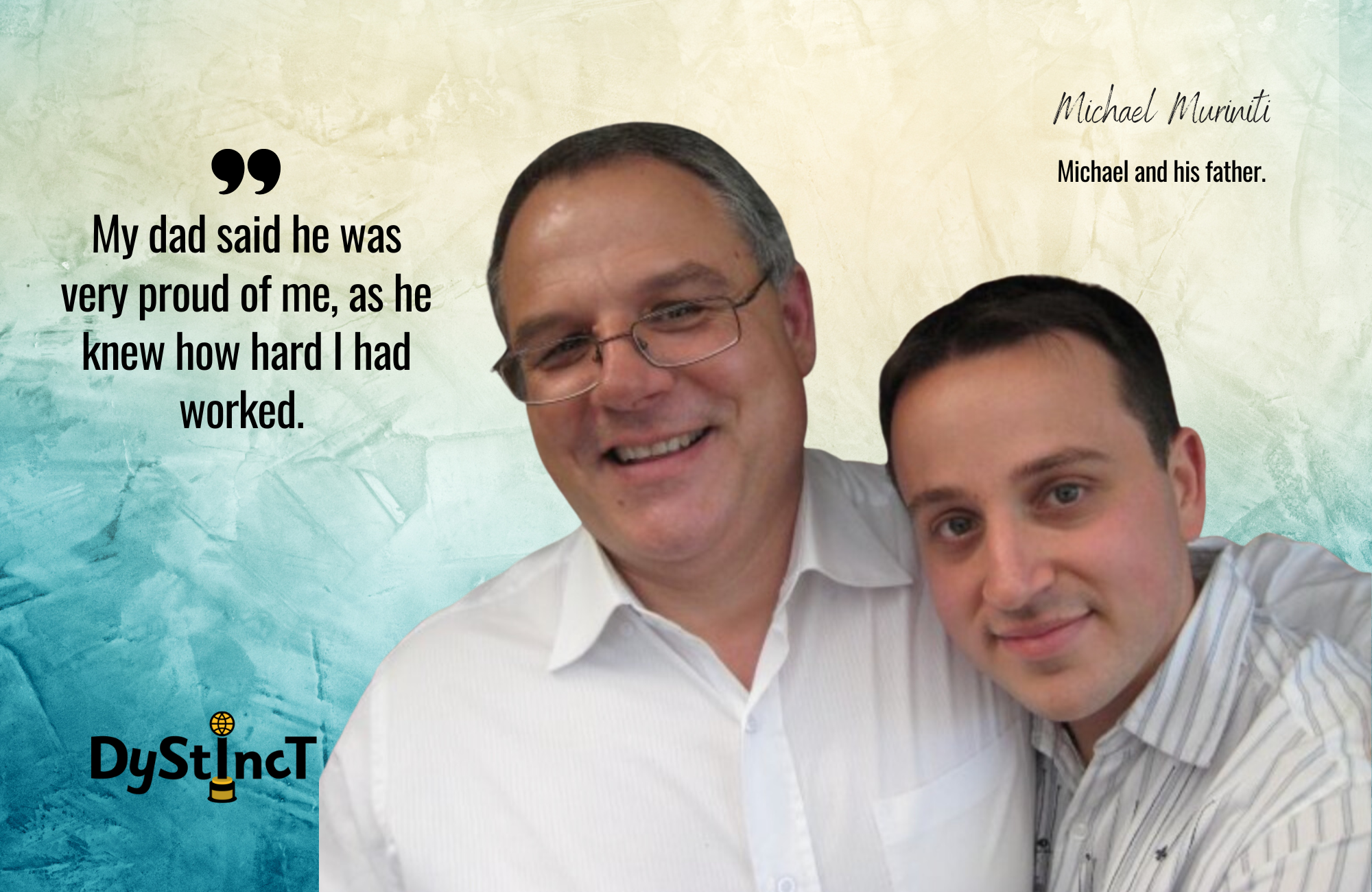
I have always felt like I had to work so much harder and had the anxiety to catch up to my peers for fear of being made to feel inadequate.
Michael pursued further learning opportunities through TAFE (Technical and Further Education) courses. At the age of 19, he successfully completed a Diploma in Marketing. Later, at 23, Michael embarked on another TAFE journey, undertaking certificate 3 and 4 courses in fitness. He then worked various jobs in different fields, such as retail, a contact centre, and administration. Despite being far removed from the times when his teachers and peers labelled him in unflattering ways, the lasting impact on Michael's self-esteem remained. Michael felt like he carried a constant sense of needing to work harder than his peers, driven by the fear of being made to feel inadequate.
As an adult, well into his late 20s, Michael began to research all about dyslexia. "I'm still unsure why I did not question things earlier. I think I was just on the treadmill of life, and when I finally took a pause, I wanted to know exactly why I thought so differently from everyone else and wanted to feel empowered by it. So, I joined a support group called Dyslexia Support Australia on Facebook and started googling as much as I could to understand what I went through all these years."
After a long and arduous journey spanning the vast majority of his life, Michael's quest for information finally helped him find peace within himself. He had now learned to love and accept himself unconditionally. He believes that if others had truly understood his struggles, he would have received the support he needed instead of constantly internalising the belief that he was the problem.
I like to think the challenges we go through make us stronger and wiser but I never shy away from the thoughts and feelings and the turmoil we can feel in the process.
As a child, Michael found the world to be a daunting and bewildering place, struggling to comprehend why he couldn't perform tasks that seemed effortless for his peers. However, his journey of self-discovery allowed him to perceive dyslexia through a different lens. He began to view it not as a curse but as a precious gift that granted him a distinctive creative outlet. Poetry became his sanctuary, enabling him to make sense of the world and express his deepest emotions in ways that verbal communication could not capture. This time, however, Michael felt a different calling. He no longer wanted to keep his words confined to the pages of his personal journal. He felt the urge to share his thoughts and emotions with others, to spread his message far and wide. "I started sharing my poetry on social media to spread my words. I feel like my poetry is not just for dyslexic people or only for people with learning differences. It touches base on the ups and downs of life and overcoming things to see them in a positive light, which I think is relatable and empowering for anyone, no matter what their brain is wired like."
Michael believes that his poetry has a relatable quality that resonates with a wide range of people as it speaks to the struggles, we all face in life. He firmly believes that no one is exempt from hardship, as we all face challenging and, at times, dark moments. "What I aim to do through my poetry is take the audience on a journey of that struggle, show its ugly side but also offer up a fresh perspective and offer some optimism for a chance to grow stronger. I like to think the challenges we go through make us stronger and wiser, but I never shy away from the thoughts and feelings and the turmoil we can feel in the process."
Writing poetry has served as a profound form of therapy for Michael. Expressing his thoughts and emotions through words has been immensely powerful and liberating for him. As an introvert, he has always found it challenging to verbalise his feelings, but poetry gives him a "unique voice" to convey his innermost thoughts to the world. Through his words, he aspires to encourage others to express themselves as well. The feedback Michael receives from his readers is incredibly heartwarming. Knowing that his words resonate with others brings him a deep sense of fulfilment. It reinforces the idea that he is not only helping himself but also making a positive impact on others' lives through his poetry. Michael is open and enthusiastic about having his works published and collaborating with other artists and writers to promote dyslexia awareness and advocacy.
Message from Michael
Message from Michael
Michael's heartfelt for neurodivergent people is simple yet profound:
You are special just the way you are!
Please take time to research dyslexia, as it is extremely empowering. You will come across a lot of famous dyslexics who have used their creative skills to change the world for the better.
Find a reliable support network. This can be family and friends, but it can also be a support network within the dyslexic community.
Take time to find out what you are good at and nurture your strengths. Each of us has a unique special gift we can offer the world. It doesn't have to fit into the expectations of others for it to be valid or valuable.
Make sure you work in a way that works best for you. Don't let other people tell you that the way you do things is wrong just because you approach it a different way.
Embrace your dyslexia. You offer this world just what it desperately needs - a fresh perspective.
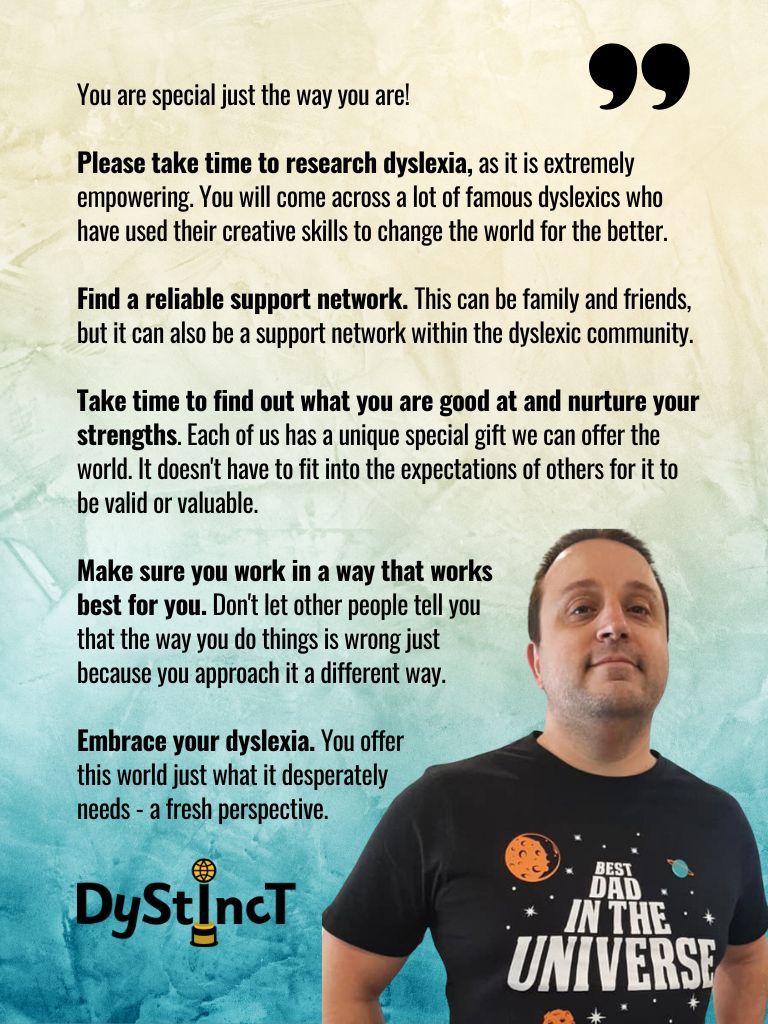
You're much more than just a number
Michael's Poem
You're much more than just a number
Michael's poem.
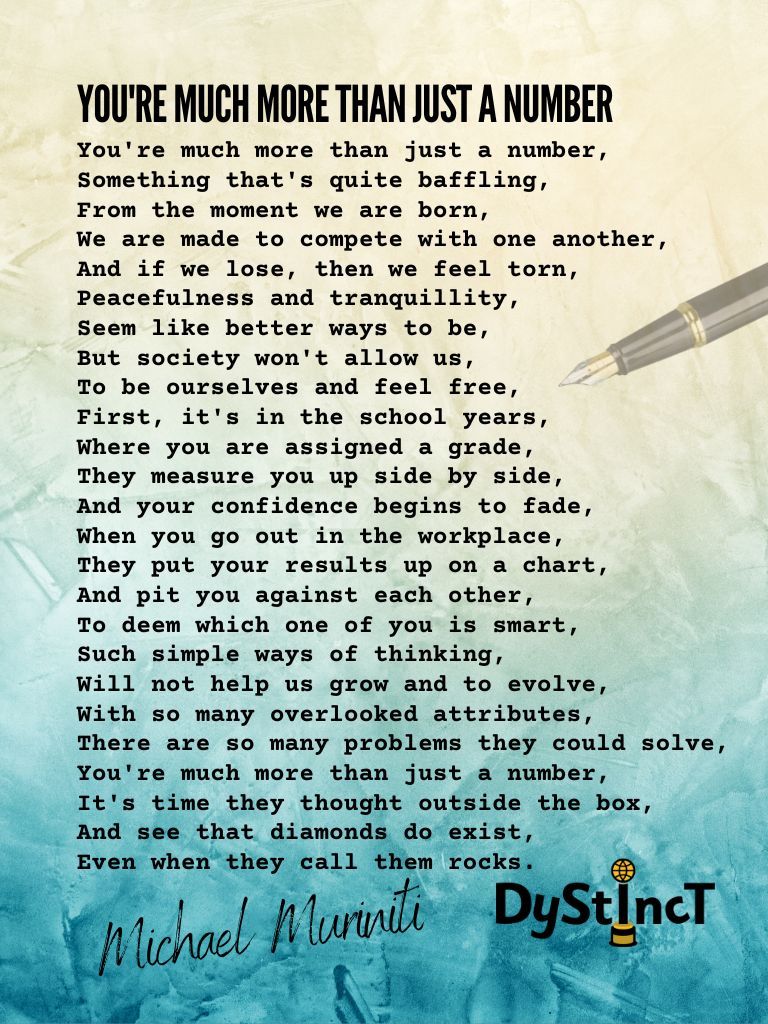
It saddens me to say this, but society unfairly measures people against each other. I experienced this at school and in the workplace, where there is a fear/anxiety-driven urge to pit up against one another. This is what I feel is driving the dog-eat-dog mentality to "one up" each other and to impress to get ahead at any cost. Many people are trying to climb the ladder at any cost, but it has a cost to those they are trampling on to get ahead. It's easy to blame the individuals, but perhaps we need to take a deeper look into what the driving cultural force is that is dictating these actions. It all begins in the classroom. Are we going to start recognising talents that don't fit into the typical mould? Are we going to keep assigning a number to dictate someone's worth or look at the value they bring to the table and those intangible skills that can't be measured on a graph or by a test? This is what I would challenge society to think about.
There is a plan for you
Michael's Poem
There is a plan for you
Michael's poem.
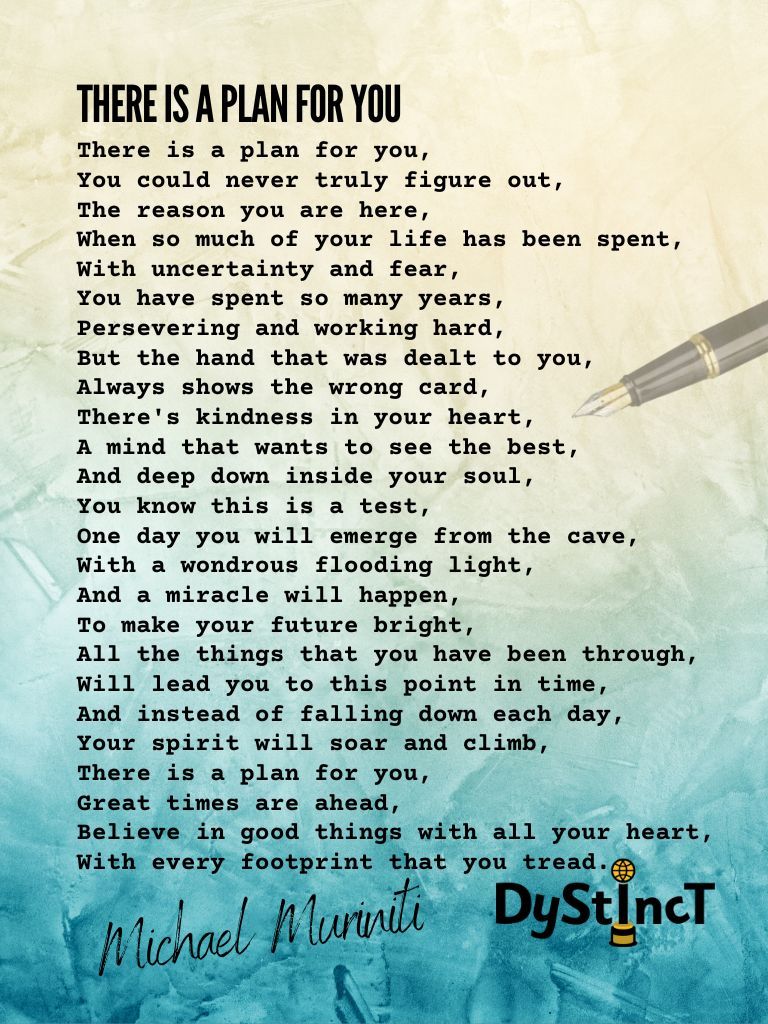
Hope keeps us going! Throughout my life, I have proven to myself that when you persevere, things eventually do improve. When you go through a time, which is unbearable, the only thing that might help you through is that beacon of hope. Without hope, life is bleak. Hope is the one thing that can motivate us when nothing else is there and when all seems lost and final. The one thing you need to keep is a belief that you will eventually overcome even if you can't see it and a feeling that we are all here for a reason and we all have something to offer this world.
Extracts from Dystinct Magazine
Extracts from Dystinct Magazine








